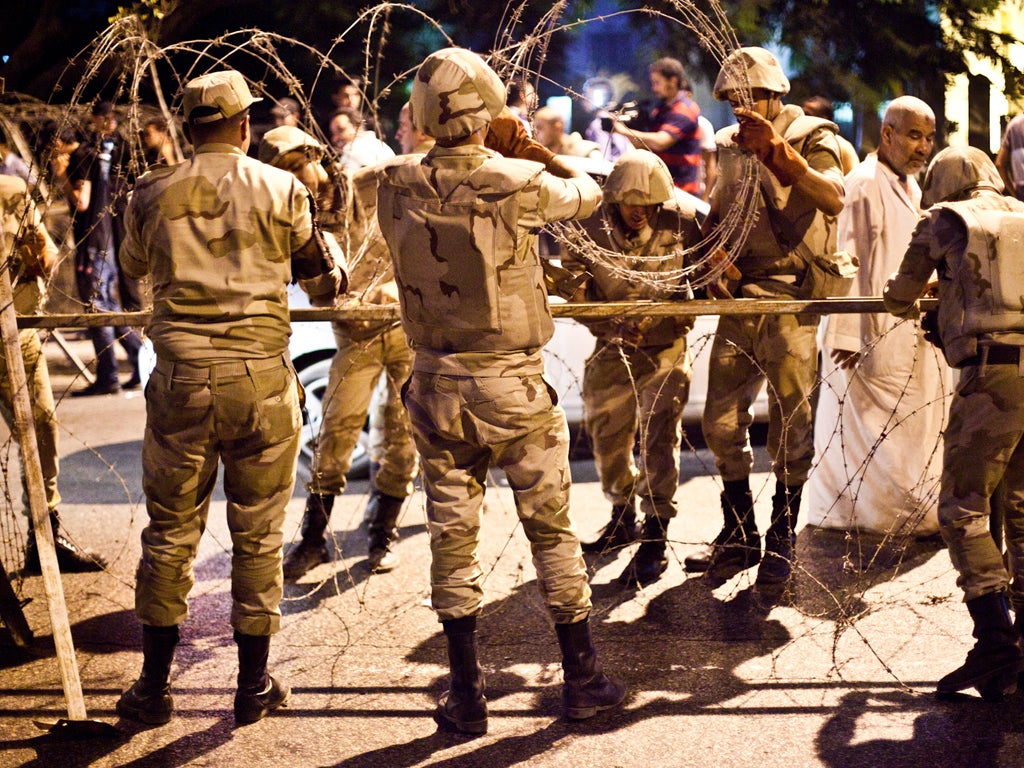Egypt crisis: A national tragedy plays out at Cairo’s stinking mortuary
These horrific scenes represent all sides of Egypt’s '‘state of emergency'


They had been cooked. It was the first expression that came to mind – and all too accurately – when I saw the remains of nine of the 34 prisoners who died at the hands of the Egyptian police on Sunday night.
Out on the desert road close to the Abu Zaabal prison, these men – seized in Ramses Square on Saturday after the Cairo police and the army stormed into the al Fath mosque – supposedly tried to overturn the prison van taking them to jail. The state security police fired a tear gas grenade into the vehicle, and all died. And having looked at those awful cadavers in Cairo’s stinking mortuary, I have to say that these poor men – not charged with any crime, unaccused, untried, victims of the glorious ‘state of emergency’ with which Egypt is now blessed – died most terribly.
There comes a time when mere descriptions cannot balance the horror of the dead. But lest history forget or treat them with less compassion than they deserve, we must, I fear, confront the reality. The bodies were hideously bloated and they had been burned from head to toe. One man had a laceration at the throat, caused perhaps by a knife or a bullet. A colleague saw five other corpses in a similar state but with bullet holes in the throat. Outside the mortuary, the state-hired thugs of the Egyptian interior ministry tried to frighten journalists away.
A middle-aged man whose friend had lost his son to police gunfire on Wednesday emerged from amid the screaming relatives – some of whom were vomiting on the concrete – and took me to a Sunni imam, immaculate in his red and white turban, who gently led me through two iron doors into the room of death. One of the morticians, Mohamed Doma, stared at the corpses in disbelief. So did the imam. And so did I. After walking past nine of these pitiful creatures – children of Egypt – I could see further corpses in another corridor. All, according to the medical staff, had been brought from Abu Zaabal prison.
Not that they ever reached the jail – which I went to see yesterday – beside a grotty Nile canal fringed by old cement factories 28 miles north of Cairo. The prison walls are high, its gates attached to neo-Pharaonic pillars. According to the police, the 34 prisoners – some reports speak of 36 dead men – rocked the truck when it was part of a police convoy approaching the institution. When it was forced to stop, the prisoners – and this, remember, is the story from the police, who are believed to have killed more than 1000 of their fellow citizens these past few days – grabbed one of the policemen and, in a successful attempt to rescue him, his colleagues fired a tear gas grenade into the truck which was packed with prisoners.
So many ‘security force’ stories – like Muslim Brotherhood stories – have been proved untrue over the past few weeks. Another story, from the newly obedient Egyptian press, reports that “terrorists” stopped the convoy and tried to free the prisoners. Since the prisoners all died, we may never know how or why they were slaughtered. Needless to say, the dead had become ‘terrorists’ by last night – why else would ‘terrorists’ try to free them, if indeed they did? – and, once Egyptians had absorbed the news of the equally awful massacre of Egyptian security men in Sinai, this now became the Abu Zaabal Massacre, to be remembered alongside the Rabaa Massacre, the Nahda Massacre, the Ramses Square massacre and all the other massacres that seem likely to come.
After these ghastly scenes, the statistics of the Egyptian Centre for Economic and Social Research make solemn reading. It says that 1,295 Egyptians were killed between Wednesday morning and Friday, 1,063 on Wednesday alone – including 983 civilians 52 security personnel and 28 bodies found under the platform of the Rabaa mosque. Thirteen policemen and three civilians were killed in an attack on the police station in Kerdasa, 24 civilians in Alexandria, six in Sharqeya, six in Damietta, 13 in Suez, 45 in Fayoum 21 in Beni Suef, 68 in Minya. This is a national rather than a Cairo tragedy. But those bodies in the morgue I suppose, represent all of them.

Join our commenting forum
Join thought-provoking conversations, follow other Independent readers and see their replies